
Black History Month (Part 6): Jack Kennedy’s civil rights hypocrisy
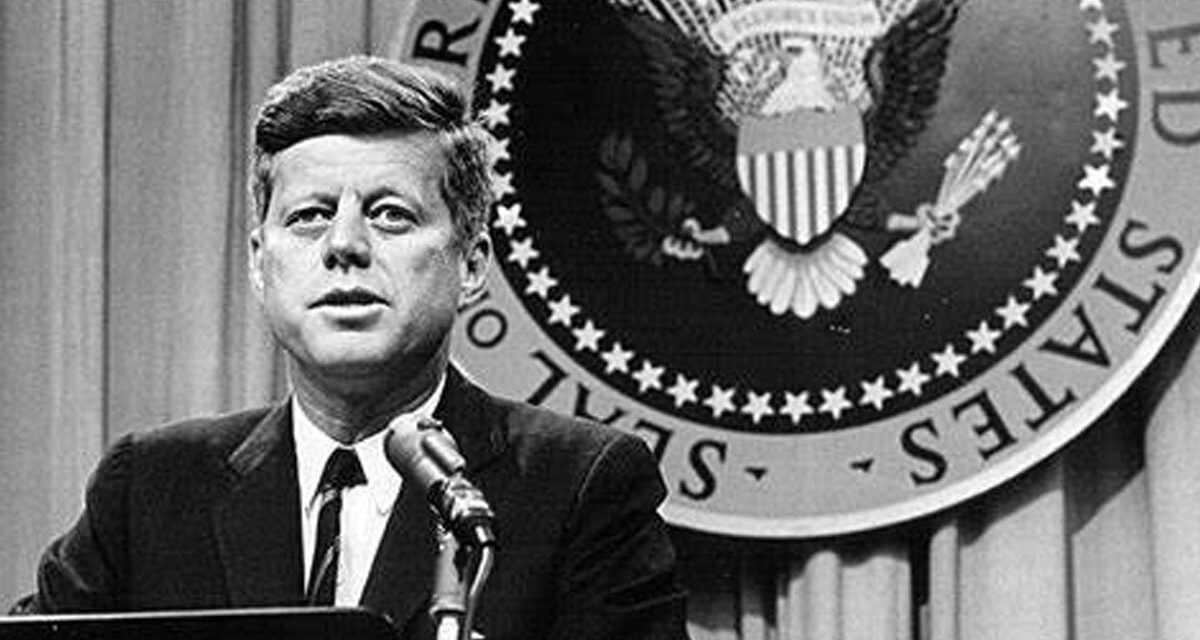
Perhaps the most shocking of all the misconceptions about the civil rights era in the mid-1900s was the role of President John F. Kennedy. He was NEVER a proponent of civil rights – not as a congressman, senator and President. In matters of civil rights, Kennedy was mostly aligned to the southern Democrat racist coalition. Yes, he talked the talk but never walked the walk.
Kennedy voted against the 1957 Civil Rights Bill and voted for the 1960 Eisenhower Civil Rights Bill only after voting with Southern Democrats to remove the all-important enforcement provision. Kennedy had proposed a civil rights bill during his 1960 presidential campaign. Once in office, he had it assigned to a House Rules Committee headed by racist Congressman Howard Smith, who promised it would never get out of committee. It never did largely because Kennedy made no effort to push it. Kennedy used his same bait-and-switch tactic in his 1963 campaign.

In my book, “Who Put Black Americans in That PLACE? The Long Sad History of the Democratic Party’s Oppression of Black Americans … to This Day”, I expose the actual Kennedy Record. It is fairly argued that we would not have had the civil rights legislation of the 1960s had Kennedy not been assassinated.
As I explained in the book.
“John Fitzgerald Kennedy came into office as the youngest elected president—slightly older than Teddy Roosevelt who ascended to the Oval Office upon the assassination of President McKinley.
Even though Eisenhower was among the most active presidential supporters of civil rights, and the Republican Party had a long and largely unblemished history in support of civil rights, Kennedy was key in setting the stage for what became the long unfounded Democratic Party narrative of Republican Party racism. With the support of a fawning press, pseudo historians and a friendly educational and publishing establishment, the false narrative became a widely held belief into the twenty-first century. The Democrat narrative became so accepted that it literally wiped out much of the public’s awareness of the significant roles the Republican Party played in the fight for civil rights, especially the critical importance of the GOP in the 1957, 1960, 1964, and 1965 civil rights acts.
Despite his noble campaign promises, Kennedy did little in putting forward a pro-active civil rights agenda in his first three years. Kennedy’s greatest civil rights achievements were reactive, most notably the deployment of federal troops to protect the Freedom Riders in 1961, and in that instance, he was pushed hard by his brother, attorney general Robert Kennedy. It was not until the lead-up to the 1964 campaign that Kennedy again talked about future legislative action on civil rights to correct some of the deficiencies in the 1957 and 1960 acts—deficiencies that he played a key role in creating.
Whether the motivation for civil rights activity was from the attorney general or the president, the common historical view of Kennedy places him in the vanguard of the civil rights movement. Kennedy’s reputation as a civil rights activist rests largely on the legacy of the 1964 Civil Rights Act—a law that was left to be passed in memoriam by his successor Lyndon Johnson and congressional Republicans. Despite his reputation, Kennedy was not responsible for any civil rights legislation during his entire political career. Kennedy died without ever fully supporting a single piece of civil rights legislation in Congress or as president. Regardless, he received more than 70 percent of the Black vote.
According to the PBS series The American Experience history documentary:
John Kennedy was elected president in 1960 partly because of his promise to secure equal rights for black Americans. Yet, once in office, he and his brother Robert, the attorney general, sought to avoid too great an involvement in the politically divisive struggle. Violent Southern conflict about black civil rights overtook the Kennedys, forcing them to intervene on the side of the integrationists. Still, President Kennedy resisted sending strong civil rights legislation to Congress, unwilling to risk further alienating the powerful Southern conservatives blocking his domestic program.
In the above quote, this author believes it would have been more precise and accurate to have replaced the word conservatives with Democrats. Calling conservatives ‘racists’ has been a longstanding misapplication of the term and part of the Democrat’s false narrative of history. The southern Democrats were not philosophic conservatives—the fundamental requirement of which is devotion to the Constitution.
The popularity of the young charismatic president was as emotional as it was rational. Kennedy brought movie star glamour and the glitter of high society back to the White House.
Among Blacks, the devotion to the Kennedy family reached almost religious proportions. Photos of Dr. Martin Luther King Jr. flanked by Jack and Bobby Kennedy appeared next to images of Jesus in millions of Black homes. Black political activist K. Carl Smith captured the sentiment when in his book Frederick Douglas Republicans, he wrote:
There is plenty of truth in the saying that a picture is worth a thousand words. As I looked back over my life, the Kennedy-King-Kennedy image led to my blind and total loyalty to the Democratic Party.
He further wrote:
Similar to many blacks, through this image, I believed with all my heart that JFK and RFK were close members of my family. I was convinced they were supporters of Dr. King and champions of the Civil Rights Movement.
Smith would later give up his theological devotion to the Kennedy myth. Smith’s study of history led him to convert to the Republican Party and begin a crusade on radio and television to educate the American public, Black and White, of the true legacy of the Democratic Party. He founded an advocacy group called the Frederick Douglass Republicans (with the ironic acronym FDR) to spread the Republican principles of the nineteenth-century abolitionist and personal friend of Abraham Lincoln.”
* * *
“Kennedy Under Pressure to Act on Civil Rights
With the Democrat administrations in the South being as lawless as the party’s paramilitary terrorist groups, the brutality against Negroes was reaching proportions not seen since the Democrats violent takeover of the South during the period referred to by the racist leaders as the Redemption in the late 1800s.
With the civil rights leadership condemning the White House for inaction and with the public increasingly outraged by the atrocities being perpetrated by the Democrat leaders in the South—and with the president’s reelection in the balance—the Kennedy brothers were under pressure to take definitive action. For the first time, President Kennedy had to make good on his campaign rhetoric.
Under pressure from his brother, President Kennedy finally agreed to act. He ordered troops to be sent to an air force base near Birmingham, promising to do whatever was necessary to prevent future violence. It was the first time in American history that a Democrat president used federal forces to enforce civil rights—an action that Republican president Eisenhower had done less than a decade earlier and Republican president Grant had done almost a century earlier.
Public sentiment also convinced Kennedy to again propose civil rights legislation to Congress. He could no longer merely talk about the need for civil rights legislation. He needed to demonstrate action—at least enough to appease the civil rights leadership without causing schism with his party’s hardcore segregationists in Congress. Despite his campaign rhetoric, civil rights leaders were wary. They had seen how his 1960 campaign promises evaporated after his election.”
* * *
“The Election of 1964
As the nation moved into the 1964 election, and Kennedy had begun his reelection campaign, the president spoke eloquently about the need for civil rights legislation. Many civil rights leaders were not confident in Kennedy’s commitment despite his rhetorical support of civil rights and the introduction of legislation. They were well aware of his lip service support of civil rights in previous campaigns—and his lack of action once in office.
They recalled his string of broken campaign promises and his votes in support of the segregationist position of his southern Democrat colleagues. Kennedy’s lack of commitment for civil rights was even noted on the official Kennedy Presidential Library website history, which states:
But Kennedy’s narrow election victory and small working margin in Congress left him cautious. He was reluctant to lose southern support for legislation on many fronts by pushing too hard on civil rights legislation.
President Kennedy may have been reluctant to push ahead with civil rights legislation, but millions of African Americans would not wait. Eventually, the administration was compelled to act.
There was a real question whether Kennedy would use the power of the White House to try to win passage of his promised civil rights legislation or would accede to the opposition by the powerful segregationist Democrats in Congress. It was widely believed that once in office Kennedy would introduce a bill and have it assigned to the Senate Judiciary Committee, headed by racist Democrat James Eastland. If Eastland did not kill or cripple the bill in committee, as had been the practice in the past, Senate Democrats would filibuster, and Kennedy would give up the fight. Up to that time, there had never been a successful cloture vote to end a filibuster on a piece of civil rights legislation.
The Kennedy Civil Rights Bill in Congress
As the Kennedy Library history noted, the president was more or less compelled to take action in view of the rising tide of public anger over the Democrat’s racial atrocities taking place in the southern states. His own credibility and his reelection were on the line.
The bill Kennedy submitted was a much weaker piece of legislation than the civil rights act that would pass in 1964. It brought immediate criticism from many civil rights leaders. It did not address the very serious problem of police brutality under Democrat regimes—police brutality that was so evident on television screens across American. The Kennedy bill did not give the Justice Department the power to initiate lawsuits against blatant discrimination. The ban on discrimination in private accommodations—buses, restaurants, etc.—was considered too weak to have much of an impact.
The Kennedy bill was taken up by the House Judiciary Committee under the chairmanship of New York congressman Emmanuel Celler a pro civil rights Democrat. With support of Republican committee members, the bill was amended to specifically ban segregation in all public venues, not just schools. It banned racial discrimination in hiring and strengthened the provision outlawing segregation in private businesses.
Most important, the Republicans in the Celler Committee added a provision that would enable the United States attorney general to file anti-discrimination lawsuits. This was similar to Title III, which Democrats, including Kennedy and Johnson, voted to strip from the 1957 and 1960 Republican civil rights acts. The civil rights community considered this an essential provision if the law was to have real meaning. Kennedy opposed it twice in the past and chose not to include it in his proposed legislation.
Scuttling the Civil Rights Bill
The bill was voted out of the Celler Committee in October. Instead of putting it up for a floor vote, Kennedy had it reassigned to the Rules Committee, which was headed by segregationist Democrat congressman Howard Smith, who was fairly described as an avid racist. As noted previously, congressman John Lewis had Smith’s portrait removed from the committee conference room because of his outrageous racial bigotry.
This was the very political ploy the civil rights community had feared. Smith promised to keep the legislation locked up in his committee. He kept his promise, and the bill never came to a floor vote while Kennedy was president. It was the same ploy Kennedy used in the 1960 campaign.
Kennedy, who did little to fight for his civil rights legislation, most certainly had anticipated the outcome. For all practical purposes, the civil rights bill for which he is given so much credit was dead in committee with Kennedy acquiescence and likely intention. The proposed legislation would have likely died in committee had it not been for Kennedy’s fateful trip to Dallas.”
* * *
Kennedy was no fan of Martin Luther King. Both the President and his Attorney General brother, Robert, were involved in FBI Director J. Edgar Hoover’s efforts to discredit King as a communist and philanderer. From the book.
“In responding to a question about how the Kennedys were targeting King, Yale University American history professor Beverly Gage, who had researched the subject, wrote:
There was a lot of back-and-forth between the FBI and the Kennedy White House, and they were certainly sharing the fruits of what they found both before and after the wiretaps. So, it’s quite clear at this point, though he denied it at certain points in his life, that Robert Kennedy did authorize the wiretaps on King and on his associates. It’s a little less clear that he knew about the bugging of the hotel rooms. But he certainly authorized the wiretaps. And the FBI was quite openly sharing a lot of this information with the White House, and the Kennedys really were responding to it.
Gage said that the Kennedys were ‘very cautious’ regarding civil rights issues because they were ‘part of a Democratic Party that was very reliant on the votes of the solid South.’
Despite the public denials, it is clear that President Kennedy and the attorney general had not only authorized the wiretaps but kept in close contact with Hoover over emerging details—and used those details for political advantage.
By May of 1963, President Kennedy was grappling with the growing pressure from civil rights leaders and, more importantly, the general public. During a privately recorded meeting on May 20, Kennedy said: ‘I think we ought to have some of these other meetings before we have it in the King group; otherwise, the meetings will look like they got me to do it.’
In the same recording, Kennedy said meeting with King would look like ‘[Karl] Marx coming to the White House.’ He then laid out his plan. ‘I’d like to have at least some Southern governors or mayors or businessmen in first,’ he said. ‘And my program [the civil rights legislation] should have gone up to the Hill first.’”
* * *
Had Kennedy been reelected and served the next four years, it is very unlikely that he would have pushed the civil rights legislation. It is something he had never done in his entire political career. As unlikely as it may seem, it was President Johnson who picked up the issue and formed an alliance with the GOP to pass the 1964 Civil Rights Act and the 1965 Voting Rights Bill. I will cover the remarkable conversion of Johnson from typical southern racist to a champion of civil rights legislation in Black History Month (Part 7).
So, there ‘tis.
EDITOR NOTE: Larry’s book is available in paperback and as an eBook on Amazon.



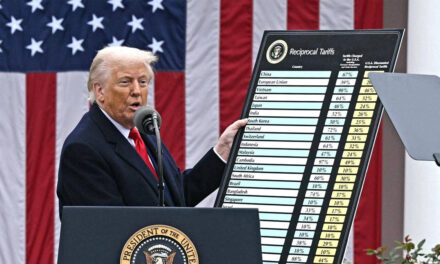
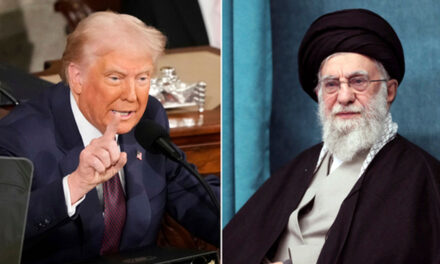


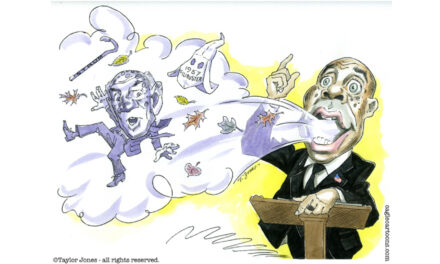
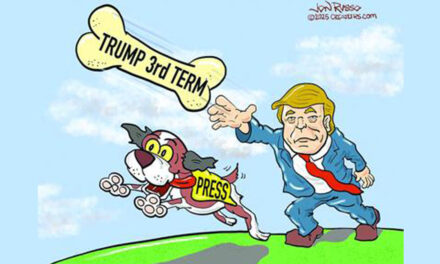










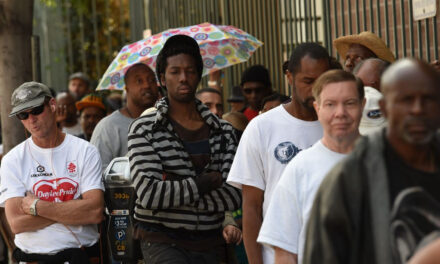









No reply’s but when the final installment of Horist’s book in serial form hits PBP’s presses it won’t be necessary to purchase it. Readers will have gotten the book’s drift by then.
It’s Larry’s war on the Democrats under the cover of Black History Month. What a fine old white gent he is.